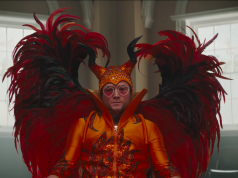Those of us who love musicals will not be thrilled with the new big-screen version of “The Phantom of the Opera” — not because it’s a terrible film (though it is), but because of the bad name it gives movie musicals. “Chicago” revived the genre and brought in audiences consisting largely of people for whom musicals aren’t usually their “thing.” Some of those people, having been eased into the genre by the swinging razzle-dazzle of “Chicago,” might wander into “Phantom,” too, only to be numbed, annoyed and confused. “See?!” they’ll say as they stagger out of the film 143 minutes later. “I told you I didn’t like musicals!”
Which is a shame, because on stage, “Phantom” is a good way of introducing people to the art of the musical. Andrew Lloyd Webber and Charles Hart’s lavish spectacle has catchy tunes and is not overly complicated or intellectual. It is accessible and ordinary, and since it is almost entirely sung (with very little dialogue), there are none of those awkward “they were just talking, then all of a sudden they started singing” transitions that can be so off-putting to newbies.
Nearly everything that is good about the stage version is lost in the movie version, which was adapted by Lloyd Webber and Joel Schumacher and directed by Schumacher. The man has directed good films, including “Phone Booth” and “Tigerland,” but when he directs bad ones, he directs the hell out of them. I’m thinking of the loud bombast of “Batman & Robin,” or the braying idiocy of “Bad Company.” All of his worst impulses — from bad casting to bad camera angles — are brought to bear in “Phantom.”
Take, for example, the role of the Phantom himself, the mad, disfigured genius who lives beneath the Opera Populaire in 1870s Paris, where the story is set. Schumacher has cast Gerard Butler, bland star of such loud, dumb films as “Dracula 2000,” “Timeline,” “Reign of Fire” and “Lara Croft Tomb Raider: The Cradle of Life.” Where in all of that did Schumacher see in Butler the potential to play a sensitive, wounded man who obsesses over a singer?
Butler’s singing voice is too lightweight for a man with as much built-up passion and anger as the Phantom. It is not an especially good voice, either, growling some of the lower notes and sounding far too modern and pop-ish for a character whose only musical influences have been opera. (Wouldn’t a man who lived under an operahouse sing more like Pavarotti and less like Michael Bolton?)
Butler may have been cast because he is handsome — which is actually a liability for this role, since the Phantom is supposed to be disfigured to the point of being shunned by all society. The way Schumacher and his makeup artists have rendered him, the Phantom has three-fourths of a perfectly good, enviably attractive face, marred only by what appears to be a burn scar around his right eye. For this he was put in a circus freak show? He ought to be uglier. But of course, people wouldn’t go see a movie with an ugly man as the romantic lead.
The object of the Phantom’s affections is Christine Daae (Emmy Rossum), a young member of the chorus to whom he has been giving covert vocal lessons. He ensures her chance at stardom by antagonizing the prima donna, Carlotta (Minnie Driver, hilarious and underused), who storms off the stage after the latest in a series of mysterious accidents for which the operahouse is infamous. Christine’s audition for the company managers is a song called “Think of Me,” which we are told comes from the third act of the opera they are rehearsing. It has always amused me that in the middle of some 18th- or 19th-century opera is a cheesy pop-musical love song that, by the sound of it, can only have been written in the 1980s. It doesn’t even approximate “opera,” nor is it a particularly impressive number. But of course, people wouldn’t go see a show that had TOO much opera in it. Setting one in an operahouse is risky enough.
Emmy Rossum’s voice is lovely, as is she, but she is devoid of passion. When she sings, her face is expressionless. Matching her in this regard is Patrick Wilson, the Broadway actor who plays Raoul, Christine’s non-Phantom paramour. For a fun drinking game, watch him closely and any time his eyes or eyebrows move, take a shot. By the time the film is over, you will have taken two shots. But of course, no one wants to see a movie in which characters’ faces register emotion. No, wait. That’s wrong.
A Phantom who can’t sing and who isn’t even hideous, other characters who sing with great enthusiasm yet who do not match it with their faces — it’s as though Schumacher hates musicals and is trying to sabotage every musical element of the film. This theory is borne out by the way he stages the songs. He seldom keeps the camera on a singer’s face for more than a couple seconds while he or she is singing, constantly cutting away or giving us long shots instead, thus destroying any hope we have of feeling the sentiments behind the lyrics. There is too much random motion, too much unfocused energy. I note that “Moulin Rouge” had a good deal of choppy editing, too, yet Baz Luhrmann was also not afraid to show us the singers’ faces for several seconds at a time. A film musical needn’t be “stagy.” There just needs to be purpose to the movement, and when a song feels like it needs less movement, the director needs to be willing to restrain himself.
Schumacher seems to have had no idea, when he was filming, that there would be music added later, or what kind of music it might be, or what sort of emotions it would be expressing. He just goes right on swooping the cameras around, showing us expensive set pieces and vibrant costumes, regardless of what the texture of the music would suggest he ought to do.
There is a very funny song called “Prima Donna,” sung by the opera managers Firmin (Ciaran Hinds) and Andre (Simon Callow) to Carlotta in an attempt to woo her back to the stage, the Phantom’s insistence that she not perform notwithstanding. Schumacher does not seem to know that this song is funny, for he directs the scene the same way he directs everything else, i.e., chaotically and peripatetically. At every turn, he convinces me he is absolutely the wrong man to direct any musical.
Some of my colleagues have said that a director as shallow as Schumacher is the perfect fit for a musical as shallow as “Phantom of the Opera,” but I think the finished product proves otherwise. On stage, “Phantom” can be a pleasure, even if it is a guilty one. On screen, what passion and excitement there is in the work has been sucked out; it has become boring, which is something the stage version could never be accused of. It is shallow, yes, but even shallow works need competent directors.
D+ (2 hrs., 23 min.; )





